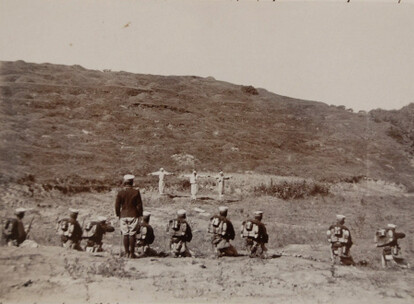hankyoreh
Links to other country sites 다른 나라 사이트 링크
Newly-discovered report details 1904 execution of Korean civilians by Japanese military

A German diplomatic paper has been discovered containing an account, with photos, of the Japanese military executing Koreans without trial for stealing railroad materials in 1904, prior to Japan’s annexation of Korea. The account also said such incidents took place nationwide.
Myongji University research professor Jeong Sang-su said on September 8 that last month he discovered in the German foreign ministry archive a report by then German Minister Resident Konrad von Saldern. In the report, which includes eight photographs pertaining to the execution of three Koreans by Japanese soldiers in late September 1904, he tells Berlin that the execution was a mistake.
It was confirmed in 2005 that five of the photos, which show scenes of the execution, were run in the French weekly “La Vie Illustre” in December 1904, but this is the first time photos of the Koreans being dragged to the execution site and a diplomatic paper pointing out the unfairness of the execution have been released.
Von Saldern, in the October 22, 1904, report sent with the photos, explained that the photos showed Japanese soldiers executing farmers -- to make an example out of them -- for supposedly stealing railroad supplies in the province of Hamgyeong Province, located in present-day North Korea, in late September 1904. He said the Japanese justified their actions in accordance with the international rights of war, which allowed Japan to execute even the citizen of a neutral nation such as Korea if there was evidence they acted as an enemy spy, but the Koreans who were executed stole not for political reasons (i.e., to help Russia) but because the supplies could help them earn a living. He added that Japan was at the time setting up a military administration in Hamgyeong Province in order to carry out their war with Russia.
The minister said they found that the farmers were not executed for political reasons, and were not turned over to a Korean court. He reported that when he visited Anju, North Pyeongan Province, which is located in present-day North Korea, several weeks earlier, he witnessed farmers who had stolen fencing wire being executed.
Von Saldern said the government of the Korean Daehan Empire, which retained formal jurisdiction over the incident, had issued protests about these massacres happening across the country, but Japan, which exercised de facto control with 30,000 solders stationed in Korea, ignored the protest and carried out the massacres.
Professor Jeong said these acts by Japan prior to its 1910 annexation of Korea could be seen as examples of Japan violating not only domestic Korean law, but international law as well. He said Korea must determine whether it is possible to demand compensation for the incident outside the provisions of the 1965 Treaty on Basic Relations between Japan and the Republic of Korea, which granted compensation for incidents between 1910 and 1945.
Please direct questions or comments to [englishhani@hani.co.kr]
Editorial・opinion
![[Column] Park Geun-hye déjà vu in Yoon Suk-yeol [Column] Park Geun-hye déjà vu in Yoon Suk-yeol](https://flexible.img.hani.co.kr/flexible/normal/500/300/imgdb/original/2024/0424/651713945113788.jpg) [Column] Park Geun-hye déjà vu in Yoon Suk-yeol
[Column] Park Geun-hye déjà vu in Yoon Suk-yeol![[Editorial] New weight of N. Korea’s nuclear threats makes dialogue all the more urgent [Editorial] New weight of N. Korea’s nuclear threats makes dialogue all the more urgent](https://flexible.img.hani.co.kr/flexible/normal/500/300/imgdb/original/2024/0424/7317139454662664.jpg) [Editorial] New weight of N. Korea’s nuclear threats makes dialogue all the more urgent
[Editorial] New weight of N. Korea’s nuclear threats makes dialogue all the more urgent- [Guest essay] The real reason Korea’s new right wants to dub Rhee a founding father
- [Column] ‘Choson’: Is it time we start referring to N. Korea in its own terms?
- [Editorial] Japan’s rewriting of history with Korea has gone too far
- [Column] The president’s questionable capacity for dialogue
- [Column] Are chaebol firms just pizza pies for families to divvy up as they please?
- [Column] Has Korea, too, crossed the Rubicon on China?
- [Correspondent’s column] In Japan’s alliance with US, echoes of its past alliances with UK
- [Editorial] Does Yoon think the Korean public is wrong?
Most viewed articles
- 1‘We must say no’: Seoul defense chief on Korean, USFK involvement in hypothetical Taiwan crisis
- 2N. Korean delegation’s trip to Iran shows how Pyongyang is leveraging ties with Moscow
- 3‘Weddingflation’ breaks the bank for Korean couples-to-be
- 4Will NewJeans end up collateral damage in internal feud at K-pop juggernaut Hybe?
- 546% of cases of violence against women in Korea perpetrated by intimate partner, study finds
- 6[Column] Park Geun-hye déjà vu in Yoon Suk-yeol
- 7“Parental care contracts” increasingly common in South Korea
- 8[Column] Yoon’s first 100 days should open our eyes to pitfalls of presidential system
- 9[Interview] Dear Korean men, It’s OK to admit you’re not always strong
- 10[Editorial] New weight of N. Korea’s nuclear threats makes dialogue all the more urgent